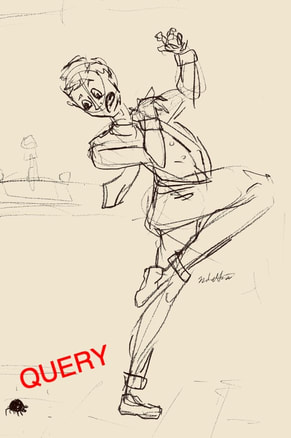 artwork by Michelle Haas
artwork by Michelle Haas Querying a literary agent is scary.
There's so much to think about BEFORE you bravely send that first fiction submission. But, with a bit of patience and planning, querying can be a manageable, less terrifying (maybe enjoyable?) experience.
Hints for the brave:
1. Be prepared. Do not send a query before your fiction manuscript is fully drafted, edited, and proofed. I've heard so many stories of writers sending out queries (or getting a like during #PitMad) before a manuscript is ready. This creates a panic if an agent requests more. Though a manuscript may not be perfect, it should be as polished as you can make it. Assuming an agent or editor will "clean up" the missing commas or misspelled words is a recipe for rejection.
2. Know what might be asked of you next. When requesting a full or partial, some agents may also ask for a synopsis, comp authors or titles, or even a marketing plan. Don't be blindsided by these requests. Before submitting, write a 1-2 page synopsis (yes, I hate writing them, too, but it's got to be done). Also, have some sense of who your target market is, what authors you may be compared to, specific titles your book could sit beside on the shelf, etc.
3. Do your research. Always consider the agent's agency website to be the most reliable source of information about how to submit. Regardless of what an agent may say about submissions anywhere else (Publishers Marketplace, a magazine interview, etc.), it is completely safe to indicate in your query "Per the submission guidelines posted on Totally Awesome Agency's website, I am submitting blah, blah, blah." No one will fault you, if you follow the agency website guidelines.
4. Visit the Manuscript Wishlist website. This super helpful website includes the current "wishlists" of agents and editors. Not all agents utilize the site, but it's a great way to search specifically for those who are looking for what you are submitting. Many agents update these listings more frequently and show more of their personality and literature tastes on this site than they do on their actual agency sites.
5. Make a wishlist of your own. Not all agents are created equal. You should want an agent as much as he or she wants you, so be sure to compile a list of the agents you are considering and even rank them. An agent that I think is a "perfect" fit (offers a helpful writing blog, represents bestsellers in my genre, seeks a story about complicated families, was an only child, enjoys baseball, likes dogs, or whatever) goes to the top of my list. If an agent sounds like a good fit, but I don't know enough to tell for sure, I put the name further down. If an agent doesn't divulge much about interests but represents my genre, he or she goes to the bottom of the list. Those at the bottom may actually be a fantastic option, but, until I can dig up more information, I just don't know.
6. Create a master spreadsheet. Taking your agent list, create a spreadsheet to include basics such as agent name (last, first), rank, agency name, agency contact info/web/address, agent contact email, submission requirements (query + 5 pages, synopsis, etc.), submission email or online form, submission date, response date, request for F/P, notes. Because I like to write for a variety of ages, I also include checkboxes for what an agent represents (PB, M, YA, NA, A). Feel free to use this PDF or customize this Excel doc for your own needs.
7. Consider creating a Submissions Only email. Some writers create a "Submissions Only" email address, used strictly for sending and receiving queries/responses, so the chance of a "request for full" from an agent doesn't get lost in a glut of spam, client communications, and Barnes & Noble ads.
8. Be strategic with the first batch. When submitting a new project, I usually start small (about half a dozen). I choose 2 agents from my highest ranked, 2 from my middle ranked, and 2 from my lowest ranked. This gives me a nice cross-section. I also choose agents who have slightly different submission guidelines. Of the half dozen, I select at least a couple who only want a query letter (no sample), so I can gauge if my query, alone, is working. The rest of my queries go to a strategic mix of agents who ask for 5 sample pages, 10 pages, or, sometimes, 20 pages (early on, I prefer submitting fewer sample pages). Again, my goal is to see what gets someone's attention, so I can adapt my strategy or even edit my manuscript, if need be.
9. Stay organized and document results. Print out your master spreadsheet and color code agents (I use sticky notes I can move around — yellow indicates outstanding submissions, green indicates request for F/P, red indicates rejection). Be sure to document submission dates and response dates, as soon as they go out or come in. When an agent sends me a final rejection, I print it and file it.
10. Look forward to the rejections. Rejections are not something to dread. They can give you a great deal of information (particularly if you're lucky enough to get a personal response vs. a form letter). Rejections allow you to move on to the next agent on your list. Again, the goal is to find an agent who wants you as much as you want them. Getting a rejection means you weren't a perfect fit. I try to replace every rejection I receive with a new submission, so there is always something out. Know who you will send to next and be prepared for the long haul. It could take 2 queries or 200 before a particular project gets picked up (or put in a drawer for another time). Even if it's a "no," learn something from the process.
Yes, querying a literary agent is scary. But news—ANY news—is a step forward. You can't get a publishing deal without putting yourself, and your work, out there.
Be brave ... and query on!
As always, thanks for the artwork, Michelle Haas.
#amquerying #WIP #fiction #WednesdayWisdom #WritingCommunity

 RSS Feed
RSS Feed

